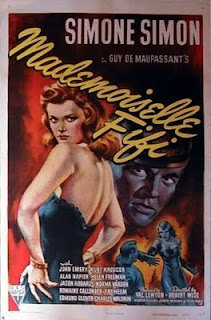 In 1936 someone at Warner Brothers got the bright idea of turning Dashiell Hammett’s novel The Maltese Falcon into a screwball comedy. The result was Satan Met a Lady. Now you might think be thinking that this sounds like one of the dumbest ideas ever. If you are thinking that, you’re dead right.
In 1936 someone at Warner Brothers got the bright idea of turning Dashiell Hammett’s novel The Maltese Falcon into a screwball comedy. The result was Satan Met a Lady. Now you might think be thinking that this sounds like one of the dumbest ideas ever. If you are thinking that, you’re dead right.I have to be quite honest here and say that I’m not that much of a fan of the screwball comedy genre. There are some exceptions. Bringing Up Baby is one of my favourite films ever. But the screwball comedy really had to be done well, and done with a cast and crew who knew what they were doing. If you couldn’t afford people in the class of Cary Grant, Carole Lombard or William Powell then you were well advised to steer clear of the genre, because of the d
 anger you’d end up with an annoying mess. Like Satan Met a Lady.
anger you’d end up with an annoying mess. Like Satan Met a Lady.It’s not that the two leads lack talent. The female lead is after all an actress by the name of Bette Davis. You may have heard of her. Yes, a great actress, but she’s not the name that immediately springs to mind when you mention screwball comedies. The male lead is Warren William, one of the great actors of the pre-code era who after the code found himself reduced to doing puerile B-comedies. Like Satan Met a Lady.
There are some bizarre changes to Hammett’s story. There’s no Maltese falcon for starters. The crooks in this picture are seeking the legendary trumpet of the medieval hero Roland. It’s a silly unnecessary change t
 hat seems to have been made to allow for the opportunity of adding some painful trumpet gags to an already tedious script. The Sydney Greenstreet role is played by a woman.
hat seems to have been made to allow for the opportunity of adding some painful trumpet gags to an already tedious script. The Sydney Greenstreet role is played by a woman.The characters have all been renamed. Sam Spade has become Ted Shayne. The basic plot outline, with the trumpet substituted for the falcon, is still there. But it’s played for laughs. Combining a detective yarn with elements of screwball comedy wasn’t necessarily a disastrous idea. In fact, combining a Dashiell Hammett detective story with elements of screwball comedy wasn’t necessarily a bad idea. The Thin Man worked pretty well for MGM. But it had the right leads, and the right mix of crime and humour. It was done with t
 he required lightness of touch. Satan Met a Lady just doesn’t have that. What it has is lots of broad humour, and an air of desperation. Bette Davis regarded it as one of the lowest points of her career.
he required lightness of touch. Satan Met a Lady just doesn’t have that. What it has is lots of broad humour, and an air of desperation. Bette Davis regarded it as one of the lowest points of her career.The big problem though is Warren William. His success in the pre-code era was based on playing cads, but they were cads who were genuinely dangerous. The charm and the wisecracks were combined with a touch of real menace, a mixture that he was able to pull more successfully than anyone else. The Production Code meant that he found himself playing loveable rogues and having to rely on a broad style of comedy that didn’t suit his urbane manner. He ended up being merely irritating.
So is Satan Met a Lady worth bothering with at all? Well if you bought the three-disc DVD Special Edition of The Maltese Falcon you got this movie included anyway, and if you really enjoy this brand of humour you might like it. I loathed it.



















